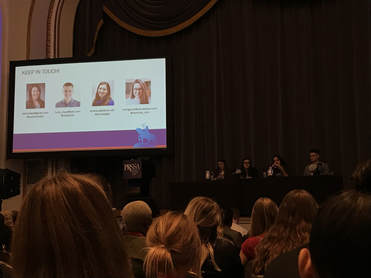 By Hannah Wagner Starting an entry-level position in public relations can be intimidating. Luckily, at PRSSA National Conference, I listened to a group of new PR professionals who had broken into the industry and were willing to share their experience with us. The panel, consisting of Laura Fooks, Communications LDP Associate at Lockheed Martin; Andrea Gils, Marketing and Communications Manager at the University of Kentucky International Center; Veronica Mingrone, Digital Analyst at Canvas Blue; and Chad Furst, Communications Senior Consultant at Booz Allen Hamilton, shared an “inside scoop” about what it was like to land, have and keep that first job after graduation. 1. Utilize PRSSA If you’re involved in PRSSA, put it on your resume! With that being said, if PRSSA is on the resume, be able to speak to it. Make it something you were involved in and discuss how it added to your college experience. Take advantage of your Chapter’s leadership opportunities. Don’t be afraid to run for the e-board or initiate a new tradition, you want to show employers you were involved whether it was a volunteering opportunity or the president of your chapter. A big thing the panel stressed was to never downplay PRSSA. Plug the organization and fill it with pride! 2. Leverage your network Your panel is everything. The network you build in college will be your lifejacket when you enter the real world. Make sure to make those connections inside your organization like PRSSA and out at professional events like national conference. When starting your job search, look for someone in the company you know or that was involved in the same organization or Chapter as you. One connection can go a long way! 3. Informational Interviews are KEY “You want to know as much as you can going into a new job,” is one thing the panel kept repeating. Informational interviews allow you to learn more about a company’s work culture and learn more about what you do and don’t like. It’s the perfect opportunity to ask questions and get the “inside scoop” of what working there will really be like in addition to showing you’re really interested in their company. You want to think about the people you’ll be surrounded with and the location you’ll be stationed at. Make sure it is a good fit! 4. Be a team player Going into a entry-level job, you’re not expected to be perfect, so don’t be afraid to try new things. Take the extra steps to show you’re trying, like volunteering to join a committee within your company, or take classes that will give you unique skills such as coding, analytics and accounting.You want to emulate someone YOU yourself would want to work with. Be nice, respect your bosses and make an effort to get to know your coworkers. 5. Be yourself and know your values When starting your job search, have two things that you really want, the rest is extra. By figuring out what’s most important, like if it’s a well-known agency, if it’s close to family, if it has flexible hours, etc., it will help you find the best fit. This job will be something you do on a daily basis, so you want to make sure you feel comfortable and happy there. The panel warned sometimes you won’t feel fulfilled when you first start your job, and that’s okay! What you need to do is focus on your niche, something you can do really well at your company. Finally, the panel stresses to show your personality, be yourself! You don’t want to fake your way through your first job, if you can’t be yourself, the panel suggested to find another job. Adjusting to your first job will take some time, and the panel made it clear that it is OK to make mistakes along the way. We are all human and we all continue to learn each day. The final advice the panel left us with was to be a real person, be who you are; take the extra steps to help out the company and know when it is time to be serious, observe a lot during the first few months to see how co-workers and your boss behaves, you don’t want to be the one who doesn’t get it. You’re only entry-level once, so take advantage of it!
0 Comments
Leave a Reply. |
Archives
February 2024
Categories
All
|

 RSS Feed
RSS Feed
